Types Of DeterminersIntroductionIn English, most of us understand what a noun or verb is. However, there is one key article of speech that is equally important to understand: the determiner. Determiners are a type of noun modifier; they come before and must be accompanied by nouns. While adjectives serve a similar purpose, the term "determiner" pertains to a relatively small group of well-established words that could be said to "mark" nouns. 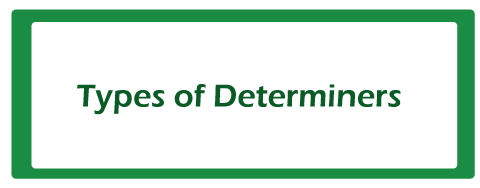
Determiners' purpose is to 'express reference,' that is, to specify what a noun refers to. For instance, when one mentions 'that package,' the listener understands which package is being alluded to. Definition And Meaning of DeterminersDeterminers - terms or phrases that come before a noun or noun phrase and help to convey its reference in context / to provide extra info about the noun - play an important part in English grammar. The definite and indefinite articles, the and a, an, are by far the most prevalent. Other English determiners comprise demonstratives like this and that, possessives like my and the kid's, and quantifiers like all, many, and four. Locate the term directly in front of a noun to discover clarifying terms. These terms can also be used preceding adjectives that describe a noun. Is your teacher expecting you to use a format other than the APA or MLA for your future writing assignment? Learn about additional styles to utilize when structuring your papers. This is kitty is very obedient and knows how to count. The word and is a conjunction in the phrase concerning the kitty. Types of DeterminersThere are two major categories. Determiners are classified into two types: general and specific. Use broad terms when you can't remember the exact details and aren't alluding to a particular person or item. Some of the most common words are a, an, many, other, what, and so on.
To refer to something precise, use precise words. The most common are the, my, your, his, her, and so on.
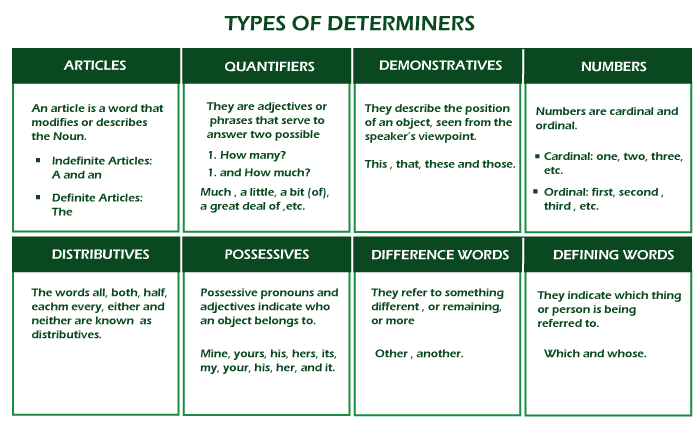
Determiners ListIn the English language, there are 5 categories of determiner terms. Articles, demonstratives, Distributive, possessives, and quantifiers are examples of these types. Let's have a look at some samples of each type.
You can call numerals like one, ten, and twenty clarifying words as an added bonus. There are three types of articles: a, an, and the. Articles That Are IndefiniteA and an are indefinite articles that perform the same function. However, they cannot be used alternately since 'a' is only used in preceding consonants and 'an' is always used in front of vowels. (Note: use 'an' before 'h' whenever it's silent, as in 'hour' and 'honor'; use 'a' before 'u' and 'eu' when these sound like 'you,' as in 'European' and 'university'.The indefinite article is used as follows :
Also, it is important to note the following aspects :
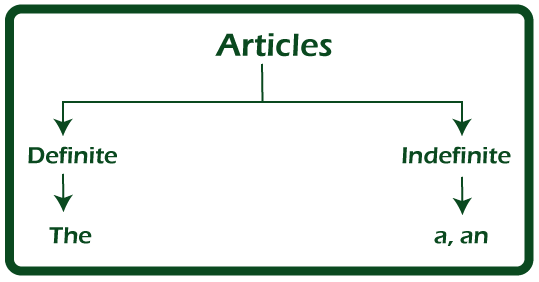
Definite ArticleIn English, 'the' is regarded as the definite article. Its applications are as follows :
QuantifiersWhat exactly are quantifiers ? 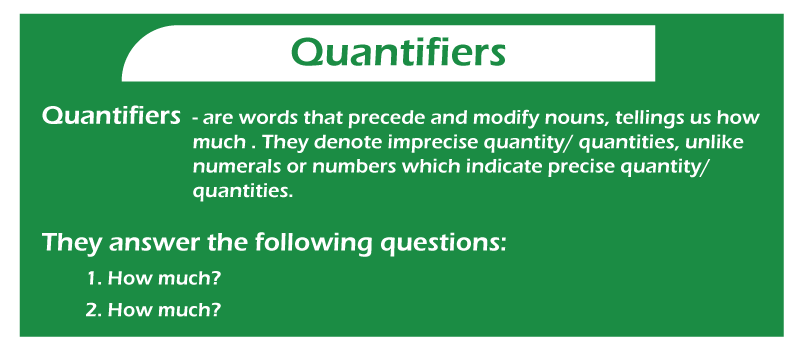
Determiners have a subclass called quantifiers. They are adjectives or phrases that answer one of two questions :
Use of a Quantifier :
As an example :
DemonstrativesThis, that, these, and those are demonstratives; they represent the location of an object as viewed by the speaker. 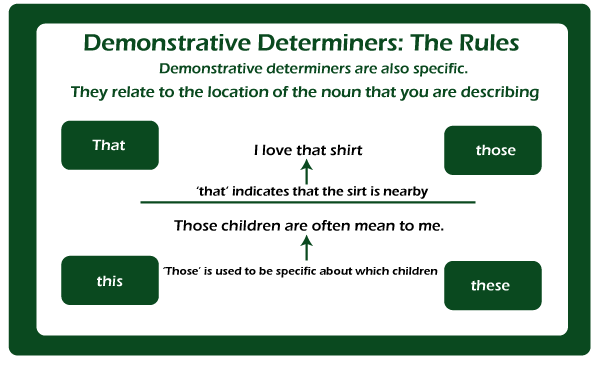
This and these (for singular and plural nouns, respectively) refer to nearby objects. For instance : Whose automobile is this ? Whose vehicles are these ? That and those (used for singular and plural nouns, etc.) allude to distant objects. Physical or psychological intimacy can exist. For instance , Who resides in that residence ? Who eats those candies ? NumbersCardinal (one, two, three, and so on) and ordinal numbers (first, second, third, etc.). Cardinal numerals are adjectives that imply quantity (There are 3 oranges in the drawer), whereas ordinal numbers suggest ranking or ordering (This is the second time for me on an airplane). DistributivesDistributives include the terms all, both, half, each, every, either, and neither. All, both, and a half - These three terms can be employed as follows : AllUncountable Noun: Brenda is considered to be the greatest cricketer of all time. 'the' + singular uncountable noun/plural countable noun
'my,' 'your,' and so on + uncountable noun/countable noun in the plural
'this, that' Plus uncountable noun/'these, that' + countable noun in the plural Take a glance at all this sand ! I don't have room for all of these activities. Both'the'/'my', 'your', and so on/'these', 'those' Plus countable nouns in plural form (note: utilized only whenever two objects are being addressed to).
Half'a' plus an uncountable noun We purchased half a kilo of wheat. 'the'/'my', 'your', and so on/ 'this,' 'that,' 'these,' and 'those' + noun
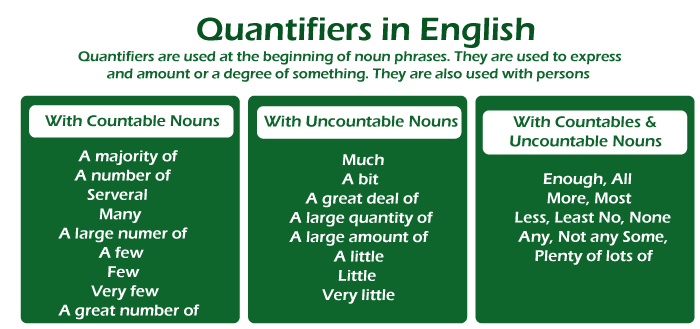
Possessive DeterminersPossessive pronouns and adjectives show to whom an item belongs. The pronouns are as follows :
His, hers, and its (third-person: This auto is his/hers = He/she owns this auto). 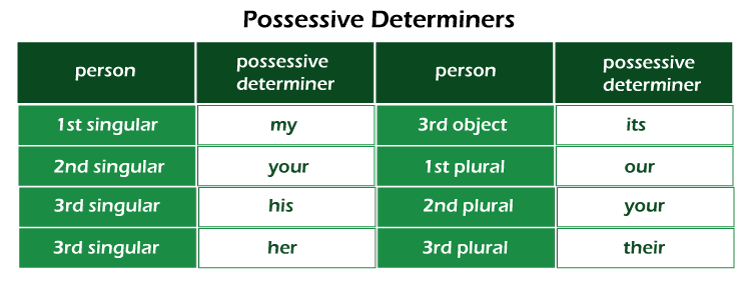
The relevant adjectives are as follows : my your it, his, and her Few more types of determiners include the difference words, defining words, and the question words. Let us have a look at these in detail. Difference Words'Other' and 'another' are 'difference words,' meaning something distinct, remaining, or more. 'Other' is used with both singular and plural nouns, whereas 'another' is only utilized with singular nouns. What other shades are available ? Is there another shade available for this ? Defining WordsWhich and whose are 'defining words,' indicating what or who is being addressed to. This is the mansion which I used to reside in as a kid. This is the gentleman whose windshield you smashed. Question Words or InterrogativeThere are a variety of terms in the English language that are usually used to form questions; these terms are called as 'question words,' often called as 'WH question words,' attributed to the fact that all of these begin with the alphabet w except got the one that begins with H.
Next TopicDeterminers Worksheet
|
 For Videos Join Our Youtube Channel: Join Now
For Videos Join Our Youtube Channel: Join Now
Feedback
- Send your Feedback to [email protected]
Help Others, Please Share










